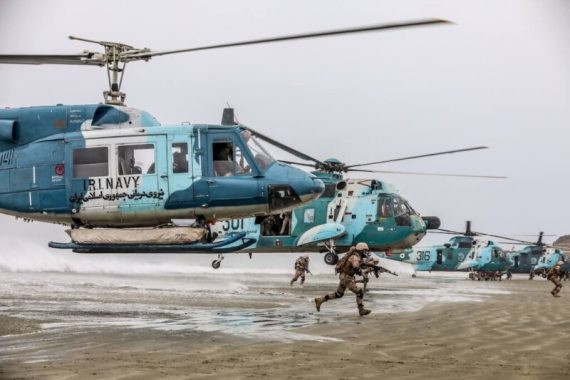A
ccording to the Qatar-based Al-Araby Al-Jadeed, discussions have taken place regarding the establishment of a joint naval force involving Iran, Saudi Arabia, the United Arab Emirates (UAE), and Oman. The primary objective of this coalition is to ensure the safety of navigation in the strategically significant Persian Gulf. China has actively participated in mediating the talks between Tehran, Riyadh, and Abu Dhabi. On June 3, following this news, Rear Admiral Shahram Irani, Commander of the Iranian Navy, stated that several regional countries, including Iran and Saudi Arabia, will form a new naval coalition in the northern parts of the Indian Ocean.
During a television program, the Iranian Navy Commander stated that almost all littoral countries in the northern parts of the Indian Ocean are willing to support Iran and collaborate collectively to ensure security. He went on to say that while Iran and Oman have conducted numerous joint naval exercises in the past, other countries such as Saudi Arabia, the UAE, Qatar, Bahrain, Iraq, Pakistan, and India are also keen on engaging in joint naval cooperation. Irani claimed that the “unjust” presence of foreign powers in the region would soon come to an end, and that the countries of the region would take responsibility for safeguarding it. Irani did not provide specific details about this development, and there have been no statements from the countries allegedly involved in the formation of this alliance.
On June 6, Chinese Foreign Ministry Spokesperson Wang Wenbin announced that Beijing is in favor of the concept of a joint naval force consisting of Iran, Saudi Arabia, the UAE, and other regional countries. During a press conference, Wenbin stated that the preservation of peace and stability in the Middle East’s Persian Gulf region is crucial for the prosperity of the countries and people in the area, and plays a vital role in global peace, the advancement of global economic growth, and ensuring a sustainable energy supply. Wenbin highlighted China’s commitment to playing a positive and constructive role in promoting peace and stability in the region.
Response to Middle East NATO?
According to Iran’s state broadcaster, Press TV, the proposal to establish a regional naval alliance is seen as a response to U.S. and Israeli suggestions made last year to create a Middle East NATO. Commander Tim Hawkins, the spokesman for the U.S. 5th Fleet and Combined Maritime Forces, criticized Iran’s claim of forming a maritime security alliance, stating that Iran is the primary cause of regional instability and cannot claim to protect the waters it threatens. Hawkins mentioned that Iran has attacked or seized 15 international-flagged merchant ships in the past two years, and stated that the U.S. is reinforcing defenses around the Strait of Hormuz with its partners.
In contrast, the UAE government announced its withdrawal from the Combined Maritime Forces (CMF) on May 31, expressing disappointment with the U.S. military’s perceived lack of response to Iran’s seizure of commercial tankers in April and May. Although UAE officials denied that their withdrawal from the CMF was a direct result of U.S. inaction against Iran’s maritime activities, a phone call on June 2 between UAE National Security Advisor Sheikh Tahnoun bin Zayed Al Nahyan and his American counterpart Jake Sullivan suggests uncertainty and tension regarding the course of action in the absence of U.S. security guarantees.
Abu Dhabi’s disappointment with the perceived weaker U.S. commitments has led to a shift in the UAE’s foreign policy, emphasizing diplomacy and partnerships with China and Russia to address regional threats from Iran. This approach may reflect both the recognition of declining U.S. influence in a multipolar geopolitical environment and a strategy to secure stronger American commitments.
GCC Challenges
The Cooperation Council for the Arab States of the Gulf (GCC) member states have faced challenges in establishing effective joint military structures and agreeing on a common vision regarding threats and challenges. Factors contributing to this include a lack of appropriate strategic culture and military power, significant divisions and rivalries within the GCC, concerns about Saudi Arabia’s dominance, and the presence of private interests.
Despite making joint declarations, the GCC states are not a unified entity, and a joint military operation in the event of a conflict would likely have a limited value. Decision-makers within the GCC primarily focus on the quantity and technological advancement of their military equipment, rather than their ability to use it effectively. As a result, the security of these countries is seen as fragile. The issue of the GCC states’ actual combat value, effectiveness, and ability to cooperate in warfare remains unresolved.
Despite significant military expenditures, the GCC states have heavily relied on Western countries for military protection and security. However, the perception of the United States as an unreliable security guarantor has led the Gulf states to seek closer ties with major powers like China and Russia. They have also increased diplomatic efforts to counter the perceived threat from Iran. Consequently, the possibility of security cooperation between Iran and the Gulf states is not entirely out of question. Nour News, a news website close to Iran’s Revolutionary Guards, suggested on Tuesday that Iran’s nuclear technology could even be potentially transferred to Saudi Arabia under the supervision of the International Atomic Energy Agency (IAEA) in accordance with international law.
Given that the countries involved have not denied the plan to establish a joint naval force, it can be inferred that discussions on this matter have taken place. However, it is important to note that the focus might be more on joint action or planning rather than forming a formal naval alliance. The Iranian Navy Commander’s statement regarding previous joint naval exercises by Iran and Oman, as well as the interest shown by Saudi Arabia, the UAE, Qatar, Bahrain, Iraq, and other countries in naval cooperation with Iran, could indicate Iran’s plans for joint exercises in the Gulf or Sea of Oman, similar to their annual exercises with China and Russia in the Indian Ocean.
Change in the course of relations
While the joint Iranian-Arab naval exercises will not be more than messaging, they will be an indication that Iran and the Gulf countries are making efforts to change the course of their relations. Although the details of this project have yet to be disclosed, it nonetheless is indicative of an important geopolitical shift that is taking place in the Middle East.
Both Riyadh and Tehran are looking for new options to manage regional equations, and Washington is no longer seen by the Gulf states as a security guarantor and a regional problem-solver. This includes China’s economic partnership plans in the region. Moreover, Washington’s pledge to build an alliance of democracies against autocracies in the aftermath of the war in Ukraine has also irritated some Gulf Arab countries.
The timing of an incident involving alleged “harassment” in the Strait of Hormuz amidst these ongoing developments is significant. On June 5, the U.S. Navy announced that its sailors, along with the UK Navy, had come to the aid of a ship reportedly harassed by the Iranian Revolutionary Guard Corps (IRGC) in the strategically important Strait of Hormuz.
In response to these allegations, on Monday, June 5, IRGC Navy Commander Abbas Gholamshahi stated that a distress call had been made by a Marshall Islands-flagged ship through the international channel, and Iranian forces had responded accordingly. Gholamshahi emphasized that certain hostile media outlets in violation of media ethics were attempting to spread misinformation, incite unrest, and legitimize the “illegitimate and unjustified presence of non-regional countries in the Persian Gulf.”
Recommended
CTF 154
The commander clarified that there were no non-regional vessels present in the area where the merchant ship sought assistance, and that media reports regarding the presence of foreign naval units were completely false. He stated that the Revolutionary Guards’ regular responsibilities include ensuring security in the Persian Gulf and the Strait of Hormuz, conducting rescue missions, and promptly responding to distress calls.
The commander also emphasized that it is the responsibility of regional powers to ensure the security of the Persian Gulf, and they are capable of maintaining long-term security in this strategically vital maritime region without foreign interference.
While steps towards normalization are being taken between Iran and the Gulf countries, the U.S. Navy, which has been conducting operations in the Persian Gulf for years as a means of exerting pressure on Iran, has initiated efforts to establish a permanent task force in the region. In this context, on May 22, the Combined Maritime Forces (CMF) based in Bahrain, established by the U.S. Navy as a “multinational security partnership,” announced the creation of a new combined task force within their structure.
This newly formed task force, named “CTF 154,” will focus on the Middle East and concentrate on training allied navies and enhancing operational capabilities within the region stretching from the Gulf to the Suez Canal. By doing so, the United States aims to discourage Gulf countries from cooperating with Iran and instead keep them aligned within the framework of the Atlantic defense concept.





